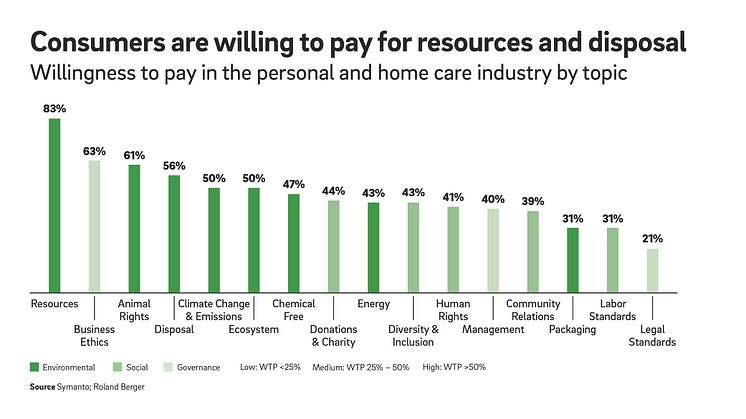
Press release -
Consumer goods industry: Increasing attention from customers and regulators on sustainability requires new business strategies and models
- Pressure on manufacturers and retailers regarding sustainability is increasing worldwide, with the Netherlands and Germany having the highest "Customer Pressure Index," especially in the food and fashion industries
- Regulatory requirements and demands from capital markets and trading partners are increasing significantly
- Sustainability offers great opportunities for the industry, but requires new strategies, business models and rapid response
Munich, June 2023: The global market for consumer goods will grow seven percent annually reaching 22.6 trillion US dollars by 2030. At the same time, competition will continue to increase, especially in relatively saturated markets with stagnating populations such as Germany. Especially in these countries, the pressure on the industry is rising, because of changing customer expectations in regard to sustainable products paired with corresponding regulatory standards and demands from capital providers and trading partners. In this environment, the main beneficiaries will be companies that consistently focus on sustainability and align their strategy and business models accordingly. This is the conclusion of Roland Berger’s recent study, "The Sustainability Game – How new rules are reshuffling consumer goods markets".
"Sustainability is already a factor that influences the purchasing decisions of many consumers," says Hannah Zühlke, Partner at Roland Berger. "This trend will continue to grow. In addition, companies are also under increasing pressure from policymakers to take ESG criteria into account. The capital market and other stakeholders, such as trading partners, are also becoming progressively critical and are increasing their demands in areas such as climate protection, circular economy or compliance with social standards."
The food and fashion sectors face the most pressure
In Roland Berger’s study, experts used artificial intelligence to analyze around 84 million conversations on social media and other online platforms across 14 countries. The result is the Consumer Pressure Index (CPI), which reflects the pressure of consumers’ expectations on the consumer goods industry in terms of sustainability. Globally, the CPI is highest in the food industry at 58 %, followed by the fashion industry with 34 %. In a global comparison, personal and home care lag far behind at eight percent. The luxury sector was further behind at one percent. "Consumer expectations vary depending on the industry," states Richard Federowski, Partner at Roland Berger. "Regarding food and personal care products, environmental issues are at the forefront, while the fashion and luxury industries are also confronted with questions and discussions about social issues."
Looking at regional differences, Western Europe has the highest comparative CPI, followed by the Americas, Asia and the Middle East. Within Europe, the Netherlands leads the way in terms of sustainability expectations. Germany ranks second with a high CPI for the food and fashion sectors and a medium CPI for personal and home care as well as for the luxury sector.
"The increasing demands for products, supply chain and corporate governance are both a challenge and an opportunity for the consumer goods industry. For example, there are already fashion companies that are expanding their business model to include second-hand shopping, specifically attracting sustainability-conscious customers," so Federowski. "Those who strategically align their business model with the concept of sustainability, and react quickly to developments, can gain a decisive advantage and set themselves apart from the competition. On the other hand, companies that do not respond to the expectations of their customers will fall behind in the competitive market. Plus, compared to more sustainable companies, they will be more affected by cost increases due to new regulatory requirements, for example rising CO2 prices."
Topics
Roland Berger is the only management consultancy of European heritage with a strong international footprint. As an independent firm, solely owned by our Partners, we operate 51 offices in all major markets. Our 3000 employees offer a unique combination of an analytical approach and an empathic attitude. Driven by our values of entrepreneurship, excellence and empathy, we at Roland Berger are convinced that the world needs a new sustainable paradigm that takes the entire value cycle into account. Working in cross-competence teams across all relevant industries and business functions, we provide the best expertise to meet the profound challenges of today and tomorrow.




